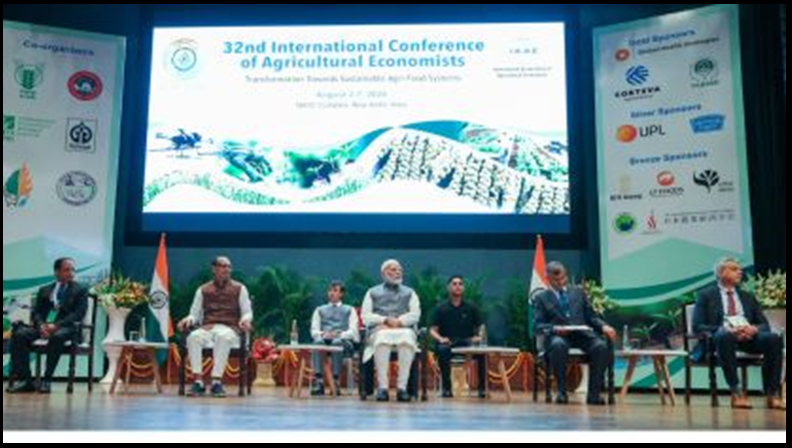STRENGTHENING INDO-AFRICAN AGRI-FOOD PARTNERSHIPS FOR GLOBAL FOOD SECURITY
Syllabus:
- GS-2– Bilateral relations between India and Africa , Solving the issue of food Insecurity , International conferences
Focus :
- This article explores the importance of a well-functioning global food system, particularly for the Global South, through the lens of Indo-African cooperation. It examines the significance of agricultural investment, the lessons learned from India’s agricultural successes, and the role of South-South collaboration in addressing food and nutritional security challenges, particularly in the context of climate change and geopolitical tensions.
Source-TH
Introduction
Context and Significance of ICAE 2024:
-
- India hosts the 32nd International Conference of Agricultural Economists (ICAE) in Delhi from August 2-7, 2024.
- The conference, featuring Prime Minister Narendra Modi as the chief guest, underscores the growing importance of global collaboration in agriculture.
- Historical Context: The roots of the ICAE trace back to India, with the founding president, Lord Elmhirst, working closely with Rabindranath Tagore to address rural development challenges in the early 20th century.
Global and Regional Challenges:
-
- Increasing food and nutritional security challenges due to climate change, geopolitical conflicts, and economic slowdowns.
- Africa’s ongoing struggle with food shortages contrasts with India’s successful Green and White Revolutions, but both regions face significant nutritional security challenges, especially among children under five.
The Role of Indo-African Collaboration
South-South Collaboration:
-
- With the African Union’s recent inclusion as a permanent member of the G20 during India’s presidency, there is a renewed focus on South-South collaboration.
- Importance of learning from global developments in food and agriculture to tackle shared challenges.
Comparative Analysis of India and Africa:
-
- A special session at ICAE 2024 compares the experiences of 20 Indian states and 15 African countries from FY05 to FY20.
- Key Findings:
- High debt service ratios in both regions lead to lower agricultural spending relative to social protection.
- African countries consistently underfund agriculture compared to Indian states, which hampers productivity and efforts to reduce child malnutrition.
- Both regions underinvest in agricultural R&D and extension services, despite the high returns on such investments.
Agricultural Investment
Investment in Agricultural R&D and Infrastructure:
-
- The study suggests reforming subsidies and reallocating resources towards agricultural infrastructure and R&D to boost growth and improve child nutrition outcomes.
- Agricultural investment is linked to poverty reduction and can save on social spending in the long term.
Role of Public Spending:
-
- Enhancing public spending on agricultural R&D is crucial for both India and Africa to overcome their respective challenges.
- Agricultural investment pays off by improving productivity, fostering innovation, and ultimately contributing to food security and poverty alleviation.
The Global Food System and Climate Resilience
Climate Change and Its Impact on Food Security:
-
- The global food system faces unprecedented challenges due to the climate crisis, conflicts, and economic slowdowns.
- Achieving the United Nations’ Zero Hunger goal by 2030 appears increasingly infeasible without concerted global action.
Investment Requirements:
-
- A study by the University of Bonn and the Food and Agriculture Organization (FAO) estimates that ending global hunger by 2040 would require an additional $21 billion annually in investments in agriculture and rural areas.
G20 Leadership and Bioeconomy:
-
- India’s leadership in the G20, followed by Brazil’s presidency, has focused on food security and ending hunger.
- For the first time, bioeconomy strategies have been presented at the G20, with China also launching its bioeconomy strategy.
- The role of bioeconomy investments, including the Global Climate Fund, is highlighted as essential for building climate resilience.
The Need for a Well-Functioning Global Food System
Indo-African Agri-Food Relations:
- Strengthening agri-food relations between Africa and India is vital for ensuring food security for almost one-third of humanity.
- Both regions must collaborate on addressing climate change, enhancing resilience, and sharing science and innovation for food systems transformation.
Global Food System Governance:
- The sequence of G20 presidencies from 2022 to 2025 (Indonesia, India, Brazil, and South Africa) indicates a potential shift in food system governance, with a focus on the interests of the Global South.
Role of India’s Leadership:
- As a key player in the G20 and a leader in the Global South, India is expected to champion the cause of food security and foster dynamic agri-food relations with Africa.
Challenges and Opportunities:
- The ICAE 2024 highlights both the challenges and opportunities in the global food system, particularly for the Global South.
- Indo-African collaboration, driven by investments in agricultural R&D and infrastructure, is essential for over coming these challenges.
Conclusion
- As climate change and geopolitical tensions continue to impact global food security, the need for a well-functioning global food system becomes even more critical.
- India’s role in the G20 and its commitment to South-South collaboration will be crucial in shaping the future of global food systems and ensuring food security for billions of people.
Associated Article
https://universalinstitutions.com/india-nigeria-relations/
Mains UPSC Question
GS 2
Discuss the significance of South-South collaboration, particularly between India and Africa, in addressing global food and nutritional security challenges. How can investments in agricultural R&D and climate resilience contribute to achieving food security goals? (250 words)




